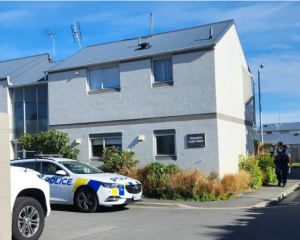
Hundreds of people are attending the formal apology at Auckland's Town Hall today including families who were impacted by the raids, dignitaries, community groups like the Polynesian Panther Party, young Pasifika activists and government officials including the Minister of Pacific Peoples, Aupito William Sio.
During the apology, Ardern also announced a series of scholarships for Pacific students and for young leaders from Sāmoa, Tonga, Tuvalu and Fiji.
A blanket of emotion covered the room as the opening ceremony for the apology played the sounds of families in fear, dogs barking, people beating on doors, and crying children, with the audience reflecting on the terror of the raids.

Today's opening ceremony consisted of an ifoga, a traditional Sāmoan ceremony in which people ask for forgiveness or receive forgiveness. Otherwise known as a reconciliation protocol, this was a big moment for Sāmoan communities who were impacted by the dawn raids.
Ardern said was very clear that the "immigration laws of the time were enforced in a discriminatory manner and that Pacific peoples were specifically targeted and racially profiled when these activities were carried out".
The memory of the raids remained "vividly etched in the memory of those who were impacted by them", she said.
"It lives on in the disruption of trust and faith in authorities, and it lives on in the unresolved grievances of Pacific communities that these events happened and that to this day they have gone unaddressed," she said.
"Today, I stand on behalf of the New Zealand Government to offer a formal and unreserved apology to Pacific communities for the discriminatory implementation of the immigration laws of the 1970s that led to events of the Dawn Raids," Ardern said.
"The Government expresses its sorrow, remorse and regret that the Dawn Raids and random police checks occurred and that these actions were ever considered appropriate," she said.

Ardern said that in many cultures - includes Pacific cultures - words alone are not sufficient to convey an apology.
"We acknowledge the enduring hurt that has been caused to those who were directly affected by the Dawn Raids, as well as the lasting impact these events have had on subsequent generations. I have heard that, for many people, the hurt was so deep that nearly 50 years later it's a struggle to talk about. We recognise that no gestures can mend that hurt," she said.
Ardern hoped that a series of offers from the Government would be accepted "to pave a new dawn, and a new beginning for the Pacific peoples of New Zealand".
These included the development of a history of the Dawn Raids for use in schools where members of the community would be able to share their experiences.
"May this opportunity help future generations gain knowledge and understanding that will help them ensure the mistakes of the past are not ever repeated again," she said.
The Government will also offer $2.1 million for education scholarships and fellowships to Pacific communities and $1 million in Manaaki NZ Short Term Training Scholarships for young leaders from Sāmoa, Tonga, Tuvalu and Fiji.
Ardern hoped that today's apology would bring "much-needed closure and healing" for New Zealand's Pacific communities.
She offered her deepest acknowledgements and respect to all those impacted by the harm caused by the Dawn Raids – including those "who continue to suffer and carry the scars".
"It is my sincere hope that this apology will go some way in helping the Pacific youth of today know, with certainty, that they have every right to hold their head up high, and feel confident and proud of their Pacific heritage, and in particular the sacrifices their parents and grandparents have made for Aotearoa New Zealand," she said.
The call for the apology
Earlier this year a call was made by Pasifika activist group, the Polynesian Panther Party, for the Government to make a formal apology.
It gained tremendous support but pressure mounted after two men led a petition for it to be effective immediately.
In an open letter to Ardern, Benji Timu, who delivered the petition, wrote the raids led to generational trauma and that it set the standard in how New Zealanders perceived Pasifika communities.
He said the raids were a foundation in which the mistrust began between Pacific peoples and authority figures like police and the government. But an apology is a step forward for growth.
Polynesian Panther Party founding member Dr Melani Anae says New Zealand's social and political climate during the 1970s was "one of racial tension and unrest as police and immigration authorities victimised Pacific Islanders they suspected of abusing their visas".












